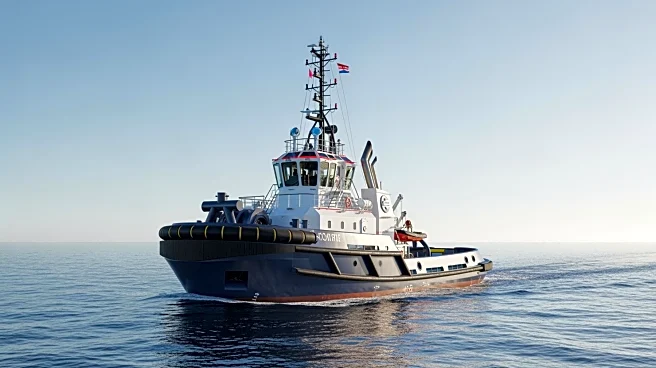What's Happening?
Med Marine has entered into a shipbuilding contract with the Namibian Ports Authority (NAMPORT) for the construction of a high-performance TRAktor tug. The agreement, signed on October 28, 2025, at NAMPORT's
headquarters in Walvis Bay, involves the construction, outfitting, testing, and delivery of a tugboat with a bollard pull capacity of 80 tonnes. This vessel will be added to NAMPORT's fleet, aiming to improve operational efficiency, safety, and towage capabilities at the Port of Walvis Bay. The contract was signed by NAMPORT's CEO, Mr. Andrew Kanime, and Med Marine's Chief Legal Counsel, Mr. Ali Can Çiftçi, with several other officials in attendance.
Why It's Important?
The addition of the TRAktor tug to NAMPORT's fleet is significant for enhancing the operational capabilities of the Port of Walvis Bay, a key maritime hub in Namibia. This development is expected to improve the port's efficiency and safety, which are crucial for handling increased maritime traffic and larger vessels. The collaboration between Med Marine and NAMPORT also highlights the strengthening of maritime ties between Türkiye and Namibia, fostering innovation and shared ambitions in the maritime sector. This project underscores Med Marine's commitment to advancing maritime infrastructure in Africa, potentially boosting regional trade and economic growth.
What's Next?
Following the signing of the contract, Med Marine will proceed with the construction and outfitting of the TRAktor tug. Upon completion, the vessel will undergo testing before being delivered to NAMPORT. The successful integration of this tug into the port's operations could lead to further collaborations between Med Marine and NAMPORT, as well as other African ports seeking to enhance their maritime capabilities. Stakeholders in the maritime industry will likely monitor the project's progress and its impact on port operations closely.
Beyond the Headlines
This partnership not only represents a technological advancement but also reflects a broader trend of international cooperation in the maritime industry. The project may inspire similar collaborations across Africa, promoting technological exchange and capacity building. Additionally, the focus on safety and efficiency aligns with global maritime standards, potentially influencing regional policies and practices.










